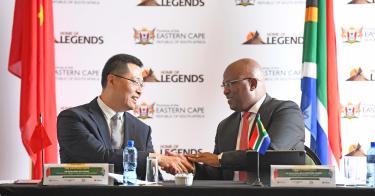Sometimes, the answer to the question “Why do people do bad things?” is simply because they can. In the case of South Africa, they can because bad behavior has been richly rewarded with billions of dollars in U.S. foreign aid and trade preferences.
Its list of misdeeds is long.
Consider South Africa’s illegal arms supply to Russia. It prompted a rare public U.S. rebuke last year after the U.S. Embassy warned it that a Russian ship docked at one of its military ports. The ship that would transport the arms was under U.S. sanctions. Pretoria’s response? South Africa held a ten-day joint naval exercise with Russia and China on the one-year anniversary of Moscow’s invasion of Ukraine.
Beyond helping project Chinese military power extend into the Indian and Atlantic oceans, South Africa has been the chief cheerleader of BRICS—China’s geopolitical project to “restructure the global political, economic, and financial architecture.” South Africa was a cofounder, lending the “S” to the group’s name alongside Brazil, Russia, India, and China.
>>> Corrupt Power Sector Strangles South Africa
South Africa hosted last year’s BRICS annual meeting, co-chaired by Chinese President Xi Jinping. The African country has been duly rewarded for its political fealty with $14 billion in Chinese investments and construction projects. Next year, South Africa will host the G20 summit. It’s a safe bet whose interests Pretoria will favor.
During the BRICS meeting, membership was extended to Iran. South African President Cyril Ramaphosa justified the offer as “a shared vision for a better world.” Iran more aptly described it as “a strategic victory for Iran’s foreign policy.” The invitation came two months before Hamas’ assault on Israel and Iran’s proxy attacks on U.S. military and diplomatic facilities. Yet South African Foreign Minister Naledi Pandor visited Tehran just two weeks after the slaughter.
South Africa has gained considerable notoriety for taking Israel to international court, accusing it of violating the genocide convention in its war with Hamas in Gaza and labeling Israel’s existence as “a 75-year-long apartheid.” In other words, there is no right to a Jewish state. In a demonstration of global chutzpah, South Africa has worked closely with Palestinian terror fronts to “document” its genocide claims against Israel.
South Africa claims it “has a moral responsibility to always stand with the oppressed because we come from a history of struggle, a history of believing that everybody deserves human dignity, justice, and freedom.” Tell that to the hundreds of millions of Syrian, North Korean, Iranian, Chinese, Burmese, Russian, Sudanese, Cuban, and other persecuted peoples that have seen South Africa repeatedly vote against United Nations resolutions condemning their repressive regimes for human rights violations. No human dignity for them.
One would think such a long and nefarious track record would lead to diplomatic isolation, at least from inflows of American taxpayer dollars. But the opposite is true.
South Africa is the ninth-largest recipient of U.S. foreign aid, receiving $6 billion between 2013 and 2022. Billions more go to South Africa through American contributions to multilateral institutions. The U.S.-funded World Bank, for instance, has committed a total of $2.6 billion in the last two years.
In 2022, South Africa received $503 million in HIV/AIDS support from the United States and is slated to receive another $900 million next year, bringing the total to $8 billion since 2003. America also funds food security, agricultural development, education, entrepreneurship, and other programs.
Over the years, the United States has bridged South Africa’s perennial power outages with 3,180 megawatts of electricity generation. Ignoring that government corruption and mismanagement are the core reasons for the outages, the United States joined other donors in gifting Pretoria with an $8.5 billion international aid package to help accelerate its green transition.
>>> Cuba Spy Scandal Reveals U.S. Vulnerabilities
South Africa is America’s largest sub-Saharan trade partner, with two-way trade standing at $25 billion. South African duty-free exports to U.S. markets make up $16 billion of that total. In short, American generosity has helped South Africa become one of the continent’s most developed economies.
One would think that South Africa’s extremist foreign policy choices would jeopardize America’s generous bilateral support. Not at all. U.S. Secretary of State Antony Blinken brushed aside South Africa’s anti-Israel actions, saying “one particular matter doesn’t take away from the important work that we’re doing together in so many other areas.”
Yes, why allow a little thing like siding with Hamas, Iran, China, Russia, and other “such particular matters” to stop the flow of billions in taxpayer money to a rogue regime?
Congress, fortunately, thinks otherwise. It has labeled South Africa’s “deepening military relationship with Russia…and joint military exercises with Russia and China” a violation of the “statutory requirement that [trade] beneficiary countries ‘not engage in activities that undermine U.S. national security.’” Recently, 210 legislators wrote to President Joe Biden denouncing South Africa for “defamatory charges against Israel on the world stage.”
Conventional wisdom will argue that cutting aid to South Africa would push it further into China’s arms. But all conventional wisdom has achieved is a deep bear hug between the two countries already. The best way to hold South Africa accountable for its dangerous foreign policy is to stop paying it.
This piece originally appeared in The National Interest https://nationalinterest.org/feature/stop-financing-south-africa%E2%80%99s-rogue-foreign-policy-210549




